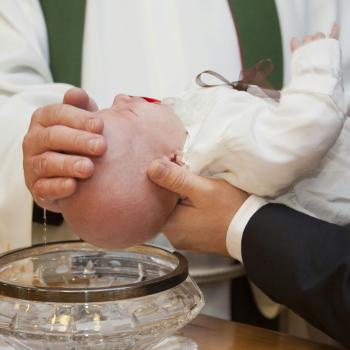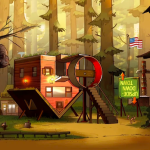How do you respond to change? Look at your hands; do you live with your hands open or closed? Open hands signify a heart open to God’s grace. Closed hands signify being closed to his grace and his plans for your life. We can learn a lesson from the raccoon.
Once upon a time, I read the book Where the Red Fern Grows. Somehow, I have managed to forget everything about the book except that there is a section detailing a method by which one could trap a raccoon.
The paragraph detailed how to trap a raccoon: drill a hole in a log, drive nails downward into the hole at an angle, and drop a shiny object, maybe some tin foil, at the bottom of the hole. The raccoon would be attracted by the foil, reach its paw into the hole, and grab the shiny object. To hold onto the shiny object the raccoon would, of course, need to ball its paw and by doing so, the width of the paw was increased making it physically impossible for the raccoon to slide its paw out of the trap. Raccoons are too stubborn to let go. These shiny objects seem to promise satisfaction but deliver death, and the sparkle of the foil is so alluring that the raccoons refuse to let go. They may die of starvation, they may bleed to death from the nails, or the hunter may come upon them and shoot. Regardless of how, these animals will literally die from stubbornness. (Cole Deike, “The Trap of Young Adulthood”).

I, too, am Stubborn
I am a very stubborn person. Far too often in my life, I feel like the raccoon holding onto something when I really should let it go. Every time I move, which happens more frequently than I would choose for myself, I am reminded of the lesson of this raccoon in this old novel. I feel just as stubborn and short-sighted as a raccoon.
Holding onto the Past
What do we hold onto? We hold onto old friendship, familiar circumstances, and past accomplishments. It is hard to let go, but in failing to do so we risk living like raccoons. We risk holding onto the shiny object and ending up trapped when God actually no longer wants us to be in a particular place or situation.
Open-handed Spirituality
When we live an open-handed spirituality, we are better able to give and to receive. We do not stay so hung up on things of the past and our hearts grow as we move through different experiences.
The other day, I listened Tom Holland speak about working out with Jake Gyllenhal. At first, he felt overwhelmed by his impressive gym partner. In the midst of everything, he kept being generous and gave more of himself than he could have ever dreamed of, which reminded me of a Gospel verse:
Should anyone press you into service for one mile, go with him for two miles (Mt. 5:41).
Tom speaks about pushing himself harder out of human respect for a fellow movie star. How am I not challenged more deeply by the way God speaks in my life? Why do I give into the temptation of holding onto the past instead of living an open-handed spirituality?
An open-handed spirituality implies a deep trust in the goodness of God. I accept that he always wants what is truly best for me, even if it means pain as part of the process. An open-handed spirituality means being ready to receive the abundance of graces that God tries to pour into my hands every day. When my hands are closed, grasping the past, I know that I am letting these graces slip by.
Power of the Gospel
Every once in a while, a Gospel verse will hit me hard, and this one from the Gospel of Matthew did so in my morning meditation. I thought of the Tom Holland discourse and I just thought, “how am I responding to the challenges that God is placing in my life?”
Every time that I have had to move, it has been hard. Yet, I have always been able to discern God’s guiding hand. He has wanted me to move on and although it is hard to tear myself away from friends, family, projects, and my own will; it is always more important to seek the Kingdom of God and his righteousness, because many other things have been given me besides (cf. Mt. 6:33).
Change is Hard
Change is hard. Every time that I have been asked to embark on a big change, I recognize that it is an opportunity to grow. I have to let go of so much of what I love. Then I am forced to open my hands, my heart, my mind, and my eyes to see, touch, feel, and receive the graces that God has prepared for me. It is so tempting to live with my hands closed. However, I want to learn to live with my hands open, receiving the graces God wants to give me.
Thank you, Lord, for the great friendships, adventures, and projects from the past. And thank you, Lord, for the pain of pulling up stakes and moving on. Thanks for forcing open my hands when I have begun to live with closed hands. And thank you for the next leg of the journey, where I hope to do your will.
How can I repay the Lord for all the good he has done for me? (Ps. 116:12).
Subscribe to the newsletter to never miss an article.


















